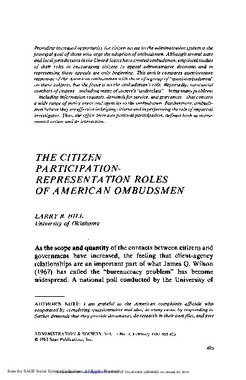| dc.contributor.author | Larry B. Hill | |
| dc.date.accessioned | 2016-01-14T19:52:52Z | |
| dc.date.accessioned | 2016-03-30T15:31:30Z | |
| dc.date.available | 2016-01-14T19:52:52Z | |
| dc.date.available | 2016-03-30T15:31:30Z | |
| dc.date.issued | 1982-02-01 | |
| dc.identifier.citation | Hill, L. B. (1982). The Citizen Participation-Representation Roles of American Ombudsmen. Administration & Society, 13(4), 405-433. doi: 10.1177/009539978201300402 | en_US |
| dc.identifier.uri | https://hdl.handle.net/11244/24944 | |
| dc.description.abstract | Providing increased opportunity for citizen access to the administrative system is the principal goal of those who urge the adoption of ombudsmen. Although several state and local jurisdictions in the United States have created ombudsmen, empiricalstudies of their roles in encouraging citizens to appeal administrative decisions and in representing those appeals are only beginning. This article compares questionnaire responses of the American ombudsmen with those of a group of "quasi-ombudsmen" on these subjects; but the focus is on the ombudsman's role. Reportedly, substantial numbers of citizens-including many of society's "underclass"—bring many problems-including information requests, demands for service, and grievances-that concern a wide range of policy areas and agencies to the ombudsmen. Furthermore, ombudsmen believe they are effective in helping citizens and in performing the role of impartial investigator. Thus, the office increases political participation, defined both as instrumental action and as interaction. | en_US |
| dc.language.iso | en_US | en_US |
| dc.publisher | Administration & Society | |
| dc.title | The Citizen Participation-Representation Roles of American Ombudsmen | en_US |
| dc.type | Research Article | en_US |
| dc.description.peerreview | Yes | en_US |
| dc.description.peerreviewnotes | https://us.sagepub.com/en-us/nam/manuscript-submission-guidelines | en_US |
| dc.identifier.doi | 10.1177/009539978201300402 | en_US |
| dc.rights.requestable | false | en_US |
